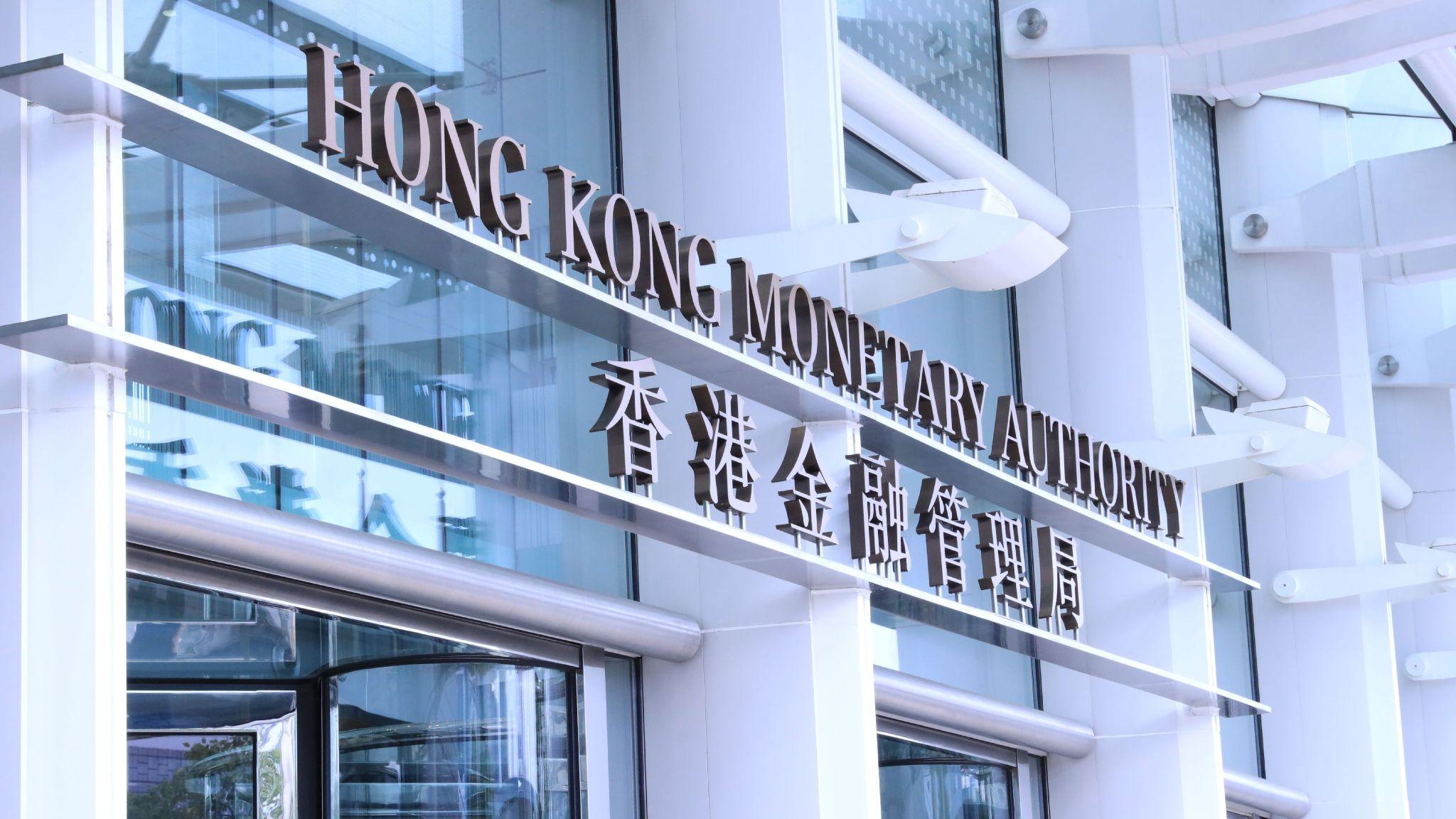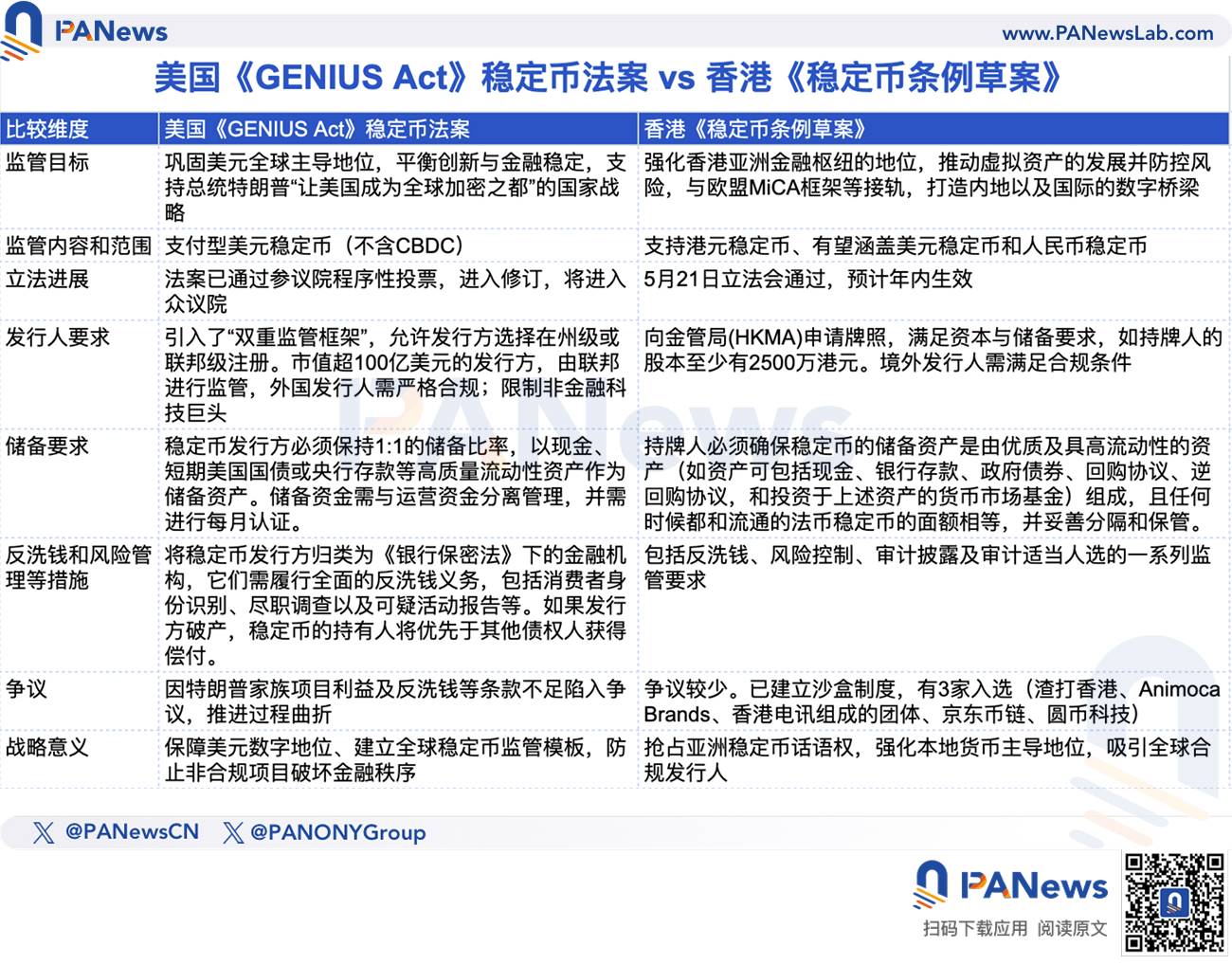Written by: Weilin, PANews
While the US stablecoin bill is making progress in the Senate, Hong Kong has taken the lead in formally passing stablecoin legislation.
On May 21, the Hong Kong Legislative Council passed the "Stablecoin Ordinance Bill", further establishing a licensing system for fiat stablecoin issuers in Hong Kong, improving the regulatory framework for virtual asset activities to maintain financial stability while promoting financial innovation. The Hong Kong SAR government expects the ordinance to take effect this year.

Currently, regulators have conducted some regulation and testing on the operational plans of three issuers in the sandbox. Committee Chairman Qiu Dagen stated that he supports promoting stablecoins pegged to the Hong Kong dollar and RMB, strengthening Hong Kong's role as a digital bridge connecting mainland China and other countries, and advocating for government flexibility in licensing to accelerate the approval process.
Three types of stablecoin activities require licensing, with equal reserves to be high-quality, highly liquid assets
The "Stablecoin Ordinance Bill" clearly specifies that the following three activities require a license:
1. Issuing fiat stablecoins in Hong Kong
2. Issuing Hong Kong dollar stablecoins in Hong Kong or elsewhere
3. Actively promoting the issuance of fiat stablecoins to the Hong Kong public
According to Caixin's report citing "Circle Technology" from the sandbox, the bill lists four key requirements for issuers: First, in terms of reserves, licensees must maintain a robust stablecoin mechanism, ensuring that the reserve assets are high-quality and highly liquid (such as cash, bank deposits, government bonds, repurchase agreements, reverse repurchase agreements, and money market funds investing in these assets), always equal to the face value of circulating fiat stablecoins, and properly segregated and safeguarded.
Second, stablecoin holders have the right to redeem stablecoins from the issuer at face value, with redemption requests to be processed without fees and within a reasonable time. Third, they must meet requirements related to anti-money laundering, risk management, disclosure, and appropriate audit selection. Fourth, they must be traded on licensed virtual asset trading platforms.
The bill specifies that licensees must have sufficient financial resources and liquid assets, with a minimum capital requirement of 25 million Hong Kong dollars. Licenses have no fixed validity period, meaning they remain valid unless revoked or the licensee is wound up or loses registration with the Hong Kong Companies Registry.
To protect the public and investors, the bill allows only designated licensed institutions to sell fiat stablecoins in Hong Kong, and only fiat stablecoins issued by licensed issuers can be sold to retail investors. These designated licensed institutions include stablecoin issuers licensed by the Financial Secretary, banks, institutions with Type 1 securities trading licenses from the Hong Kong Securities and Futures Commission, and licensed virtual asset trading platforms in Hong Kong.
To create an effective deterrent, the bill sets clear penalty rules for violations. Conducting regulated stablecoin activities without a license can result in fines of 5 million Hong Kong dollars and seven years' imprisonment; selling stablecoins through non-designated licensed institutions can also result in similar penalties.
Three stablecoin institutions already in the sandbox, JD stablecoin poised for launch
The Hong Kong SAR government had already published the "Policy Statement on Virtual Asset Development in Hong Kong" in October 2022, demonstrating its commitment to improving the virtual asset regulatory framework. In response, the "Anti-Money Laundering and Counter-Terrorist Financing Ordinance" (Chapter 615) was amended in December 2022 to introduce a licensing system for virtual asset service providers. Following the virtual asset trading platform licensing system's implementation in June 2023, Hong Kong is working to further improve the regulatory framework for virtual asset activities, including introducing a licensing system for fiat stablecoin issuers.
In December 2023, Hong Kong announced plans to establish new legislation to implement the stablecoin issuer licensing system. The regulatory sandbox approved three institutions for testing on July 18, 2024, published the draft text in December, and was finally passed by the Legislative Council on May 21, 2025.
Currently, the Hong Kong Monetary Authority (HKMA) has launched a stablecoin issuer sandbox to understand the business models of institutions interested in issuing fiat stablecoins in Hong Kong and communicate regulatory expectations and guidelines. The first batch of three participating institutions was approved to enter the sandbox on July 18, 2024. These include a group consisting of Standard Chartered Hong Kong, Animoca Brands, and Hong Kong Telecommunications, JD Coin Chain Technology (Hong Kong), and Circle Innovation Technology. Regulators have already conducted some regulation and testing on the operational plans of issuers in the sandbox.
It is worth noting that JD Technology Group has recently been recruiting for multiple RWA-related positions, explicitly requiring product design to seamlessly integrate with JD stablecoin and digital RMB. The group is also hiring for an "Overseas Financial Business Development" position, focusing on implementing stablecoin business, which suggests that JD stablecoin may be poised for launch following the bill's implementation.
After the stablecoin issuer licensing system officially takes effect in Hong Kong, there will be a 6-month transition period for existing issuers already conducting the three licensed activities, allowing them to apply for licenses within the first 3 months after the system's implementation.
Participating in global stablecoin competition: Potential to develop RMB-pegged stablecoins, lawmakers call for "flexible" licensing
As the Legislative Council conducted the third reading of the "Stablecoin Ordinance Bill", the US GENIUS Act stablecoin legislation is progressing. On May 22, the US Senate passed a motion to debate the GENIUS Act with 69 votes to 31, marking the bill's entry into the amendment discussion stage. This could become the first federal stablecoin regulatory framework in the United States.

Hong Kong's stablecoin ordinance bill was drafted with reference to existing and pending stablecoin regulatory regulations.
In the Legislative Council, Committee Chairman Qiu Dagen expressed satisfaction that the government clarified its consideration of including RMB as a potential legal stablecoin currency alongside the Hong Kong dollar and US dollar.
"I strongly support incorporating RMB into the local stablecoin system because we can serve as a digital bridge connecting mainland China and other countries. Through an RMB-based stablecoin, we can attract more blockchain projects and institutional investors to Hong Kong, creating a digital financial ecosystem driven by Hong Kong dollars and RMB, further strengthening Hong Kong's status as a financial hub. Additionally, this can accelerate the internationalization of the RMB," he stated. Especially in the global de-dollarization trend, RMB stablecoins could become a diversification choice for trade, investment, and reserves in many countries, including Belt and Road and Middle Eastern nations, helping to enhance RMB's status in international trade and as a safe-haven asset.
In terms of licensing policy, Councilor Qiu Dagan urged the government to maintain an open and flexible attitude, allowing more institutions with capabilities and resources to participate in competition. He stated, "I hope the government can consider future licenses with a flexible mindset, giving more issuers the opportunity to compete in Hong Kong, which is a normal process. Just like now, there are mainly two stablecoins in the world, (occupying) most of the transactions, but we have a hundred flowers blooming, with many going through elimination to form the current two stablecoins in the US dollar market. So we hope that in the future in Hong Kong, we can strive to have more people enter the market with stablecoins of different weights, such as Hong Kong dollars and RMB."
In his view, as long as the issuer proves to be financially sound and has sufficient regulatory capabilities, through healthy competition, giving Hong Kong the opportunity to develop an internationally accepted stablecoin market with currencies other than the US dollar would have great significance and impact on Hong Kong's financial development.
Councilor Qiu Dagan called for the licensing work to be carried out quickly after the bill is passed, attracting more potential operators who are interested and meet the conditions to launch and test stablecoins with different currencies and collaterals in Hong Kong as soon as possible. While application scenarios are important, he hopes the government can maintain flexibility in approval requirements and other aspects to allow different schemes to be tested in Hong Kong.
With the implementation of the regulatory system for virtual asset trading platforms and stablecoin issuers, the Hong Kong Monetary Authority stated that the government will continue to support the development of the virtual asset industry. The government will next conduct consultations on virtual asset over-the-counter trading and custody services, and will publish the second virtual asset policy declaration.








